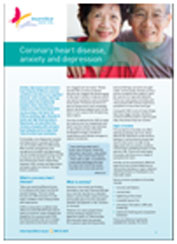There is a strong link between social isolation and lack of quality social support, depression and cardiovascular disease.
Social health
 People, who have good social support networks (e.g. close family members or friends to confide in and socialise with) have decreased risk of developing cardiovascular disease, are healthier and live longer.
People, who have good social support networks (e.g. close family members or friends to confide in and socialise with) have decreased risk of developing cardiovascular disease, are healthier and live longer.
Emotional health – stress and depression
Some stress is a normal part of life.
Continuous ongoing stress can cause chronic depression in some people. Depression is a risk factor for cardiovascular disease.
Depression can go hand-in-hand with cardiovascular disease:
- people who have cardiovascular disease are more likely to suffer from depression. Depression also slows recovery from heart attacks/surgery and increases the risk of having another heart attack.
- people who are depressed may be at greater risk for developing cardiovascular disease.
Possible mechanisms for the development of cardiovascular disease are:
- elevated levels of stress hormones (cortisol and adrenaline) – stress the heart and arteries by:
- increasing heart rate
- increasing blood pressure
- causing irregular heartbeats
- increases the clotting of blood – increased risk of heart attack
- increases the levels of the inflammatory protein C-reactive protein (CRP)
- people who are depressed are less likely to take their medications regularly
Depression can also cause people to adopt an unhealthy lifestyle:
- smoking
- overeating
- not doing any physical activity
- excess alcohol consumption
These make matters worse as they are risk factors for cardiovascular disease.
 Treatments
Treatments
Simple things you can do:
- eat and drink sensibly
- if you smoke, stop
- do regular physical activity
- get enough sleep
- recognize good things about yourself
- set reasonable expectations for yourself
- say ‘no’ to unreasonable demands
- find time to relax every day – relaxing music, deep breathing, meditation, massage, guided imagery, yoga
Depression needs to be treated professionally. If you think that you have depression, talking to your doctor is the first step.
 For more information see:
For more information see:
Coronary heart disease, anxiety and depression.
(An excellent publication by Beyondblue and the Heart Foundation)
Where to get help
- Your doctor
- Talk to your family and friends
- Lifeline 24 hour telephone crisis support telephone: 13 11 14
- Kids Helpline Australia’s only free, private and confidential, telephone and online counselling service specifically for young people aged between 5 and 25, any time and for any reason telephone: 1800 55 1800
- Beyondblue Learn more about anxiety and depression.
Talk it through with their support service, telephone: 1300 22 4636
Email or chat to them online at www.beyondblue.org.au/getsupport - Mindhealthconnect Access to trusted, relevant mental health care services, online programs and resources
- Headspace National Youth Mental Health Foundation
- Self-help materials
The advice in this website does not replace advice from your GP or healthcare provider.
